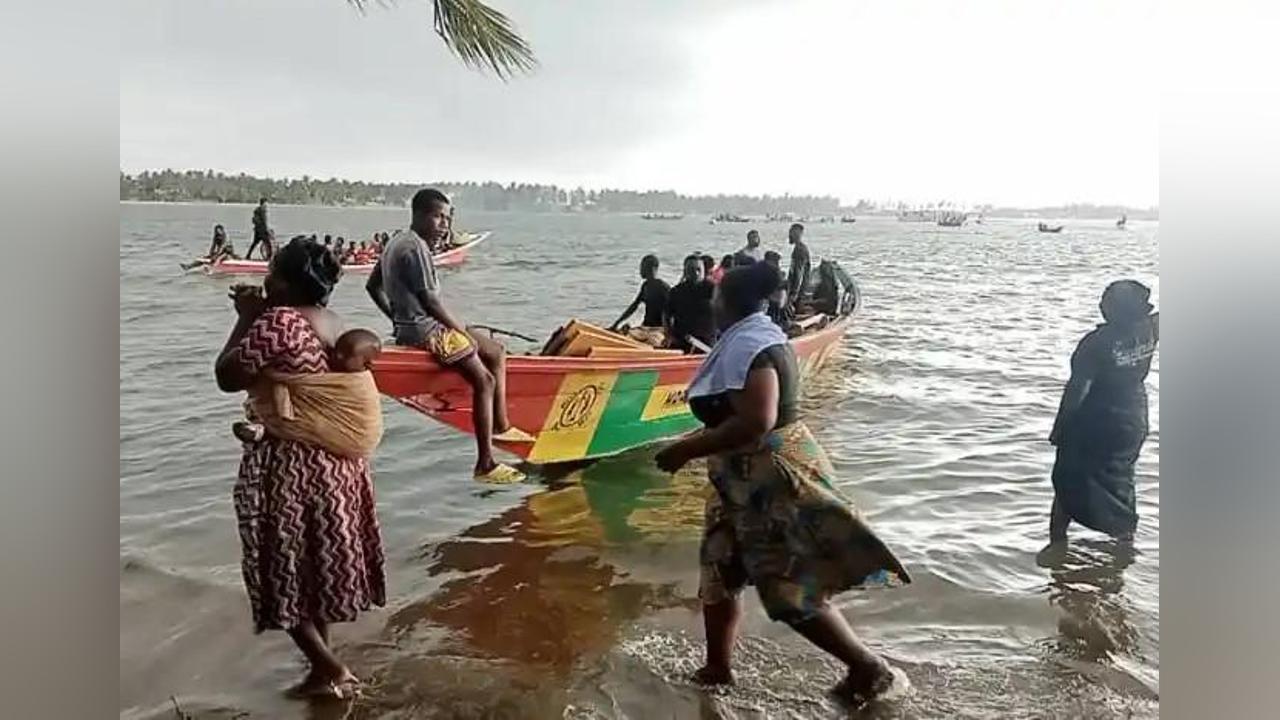Africa-Press – Ghana. As dawn approaches, the calm surface of the Volta River awaits quietly to receive and give hundreds of schoolchildren from island communities a fierce adversary as they embark on a daily journey to access education away of their communities.
From island communities like Azizakpe, Alorkpem, Aflive, Pediatorkorpey and 28 other overbank areas in the Ada East District of the Greater Accra Region and in the South Tongu District in the Volta Region, schoolchildren, some as young as 11 and even the physically challenged, daily risked their lives as they paddled canoes across the vast and unpredictable Volta River just to reach their classrooms, which are away from their vicinity.
With no life jackets, guidance from trained boat operators, or reliable transport alternatives, these young ones, many aged between 11 and 17, below the legal adult age, navigate their way through the waters alone, twice a day (going and returning), in search of academic empowerment.
The Volta River
The Volta River is not just a means of passage for the residents but also serves as a source of livelihood for the island communities, as fishermen and oyster miners rely on it for their fish and oysters, respectively.
Women also get the opportunity to make a living by trading its fish and oyster resources to sustain their families economically.
Despite its economic benefits and transport prospects, Ghana has recorded some disturbing incidents of the drowning of fishermen, community members and schoolchildren over the years.
In April 2002, 50 bodies, including those of schoolchildren, were recovered from the river after a boat accident which occurred near Amevlookpoe, an island community.
Reports indicated that among the dead were 36 pupils and students from the Jasikan District.
The river, which stretches beyond the Volta Region and Ada in the Greater Accra Region, in January 2023, swallowed eight schoolchildren when they were travelling from Wayokope when on which they were travelling capsized.
In March and September 2023, three students drowned with some of their parents in an attempt to cross the river to a funeral in a nearby village. Some boat operators and fisherfolk rescued the others in the boat.
The communities which are about a minimum of one kilometre from the Ada Estuary most often experience storms from the sea, making the river rough and unstable, rendering its crossing with canoes very tough and difficult. This requires a lot of energy to traverse from one point to another, a dexterity that the children do not possess.
“Each time my child sets out in a canoe, I say a silent prayer,” says Adzo, a mother in Aflive.
“We’ve seen too many lives lost. But what choice do we have? “she asked.
Boat Operations
Passenger boats ply some of these river routes, charging between GHS 3 and GHS 5 per person depending on distance. According to Mr. Ernest Doe, Secretary of the Ada Boat Operators Association, charter services can cost as high as GHS 100, while recreational cruises can attract GHS 800 in payment.
Even though the fares may seem insignificant, for many of the island dwellers, who are already battling poverty, these fares are simply unaffordable as they must pay in and out fares daily for their children.
Accessing Education
Some island communities have only basic schools up to primary six; therefore, upon completing primary school, the children must cross the river to continue their education at junior high and senior high levels out of their communities. For these determined learners, the river becomes not just a challenge but a barrier that tests their will to succeed.
According to some students, they were terrified the first time they embarked on the journey across the river, indicating that with time, they have become accustomed to it, even though sometimes the water is rough, and they only hope to go and return home safely.
They said the river can become violent with little warning, requiring great effort and skill to navigate, especially in crude wooden canoes with no safety support, compounding their woes.
They stated that groups promised that they would be provided with lifejackets and bigger vessels or boats but have yet to get any.
An urgent cry for intervention
There are over 740 islands and overbank communities nationwide where children risk dangerous river crossings daily to pursue education. The absence of critical infrastructure such as life jackets, safer boats, river guards, and emergency response mechanisms, amplifies the danger.
Teachers, healthcare workers, and even government officers often refuse postings to these communities, citing unsafe river transport and lack of logistics.
Asafoatsengua Tsatsu Pediator V, Senior Warlord of the Kudzragbe Clan and overlord of the island communities in Ada, noted the worsening conditions due to climate change and made a passionate appeal to the government, non-government organisations and philanthropists.
“We need bigger boats, outboard motors, and lifejackets to safeguard our children,” he said. This will enhance their safety in their bid to pursue quality education,” he said.
Conclusion
The story of these island students is one of courage, resilience, and hope. But bravery should not be the price of basic education. As Ghana champions inclusive learning for all, the plight of these children cannot be overlooked.
We must not wait for the next tragedy before acting. Until these communities are equipped with the infrastructure to guarantee safe passage or until schools are built closer to home, the Volta River will remain both a bridge to the future and a looming threat.
Source: Ghana News Agency
For More News And Analysis About Ghana Follow Africa-Press







